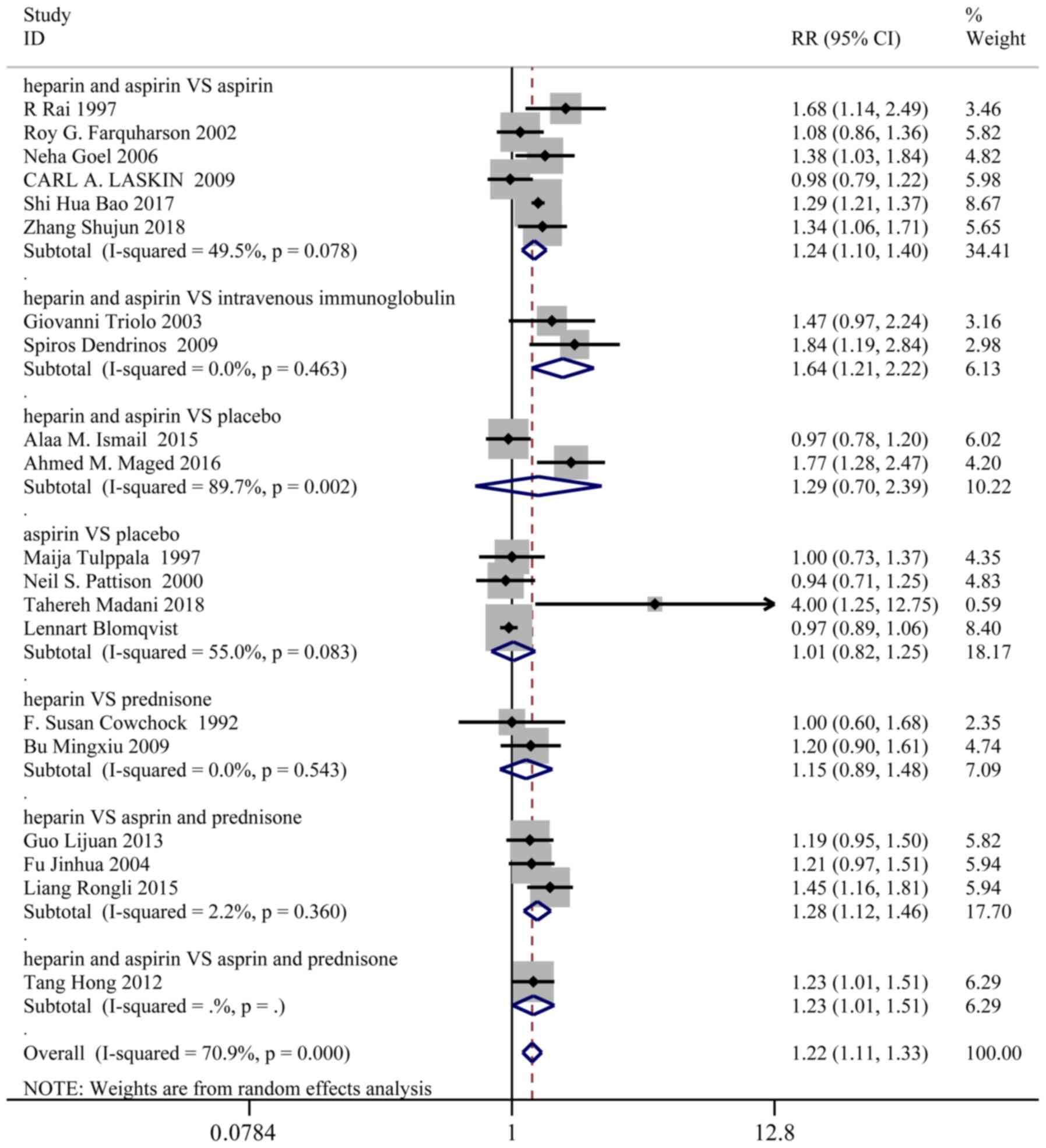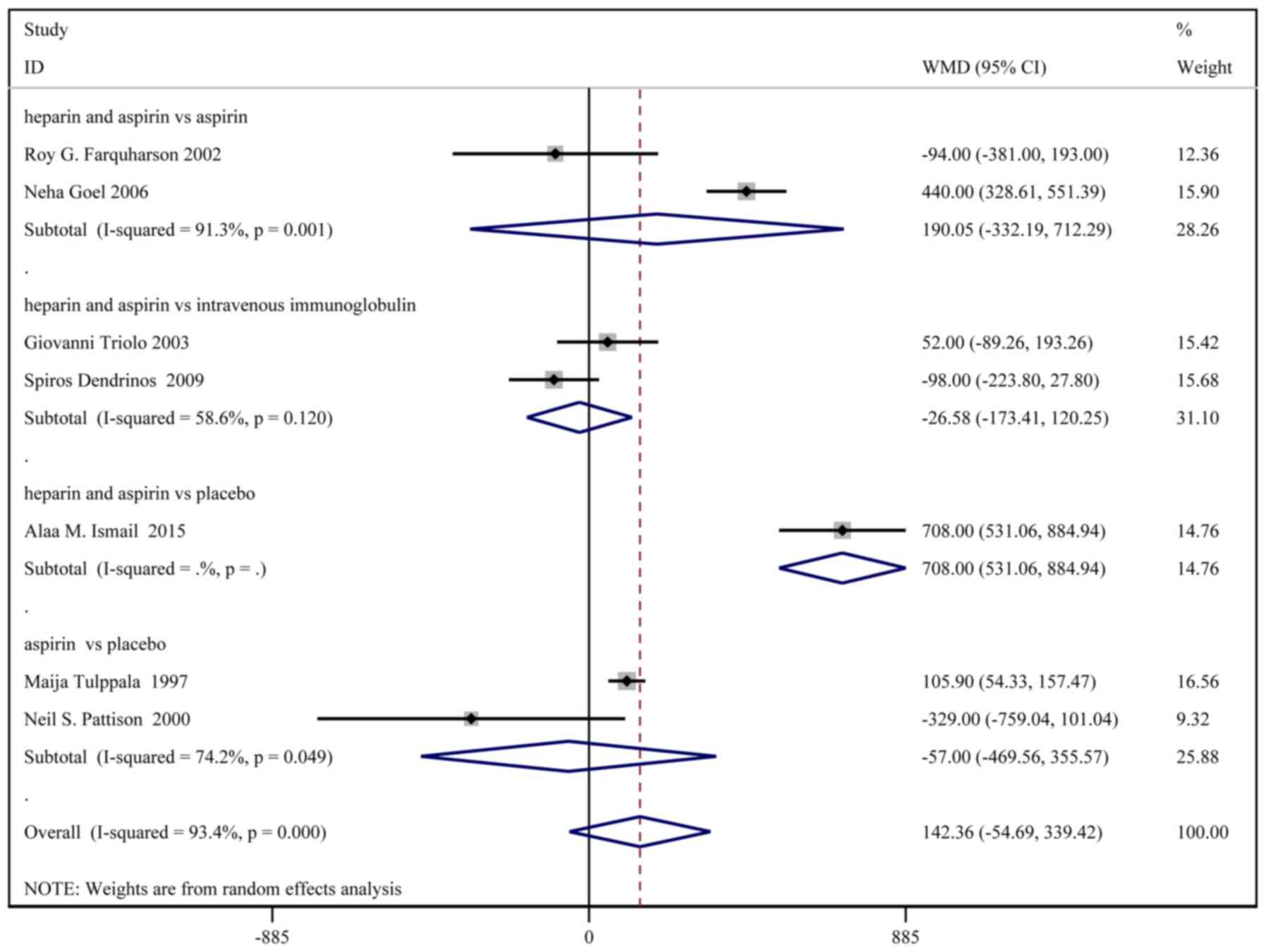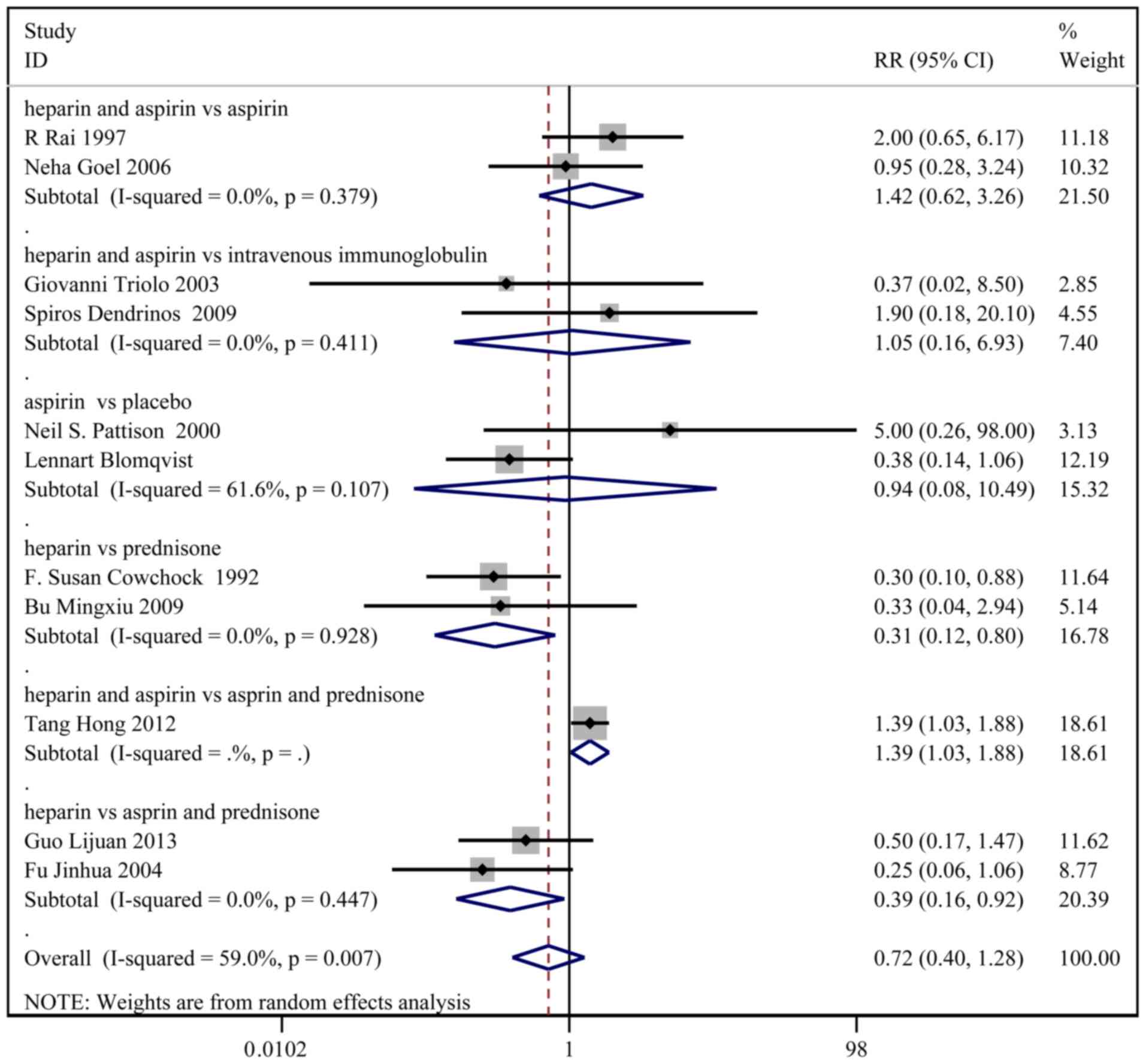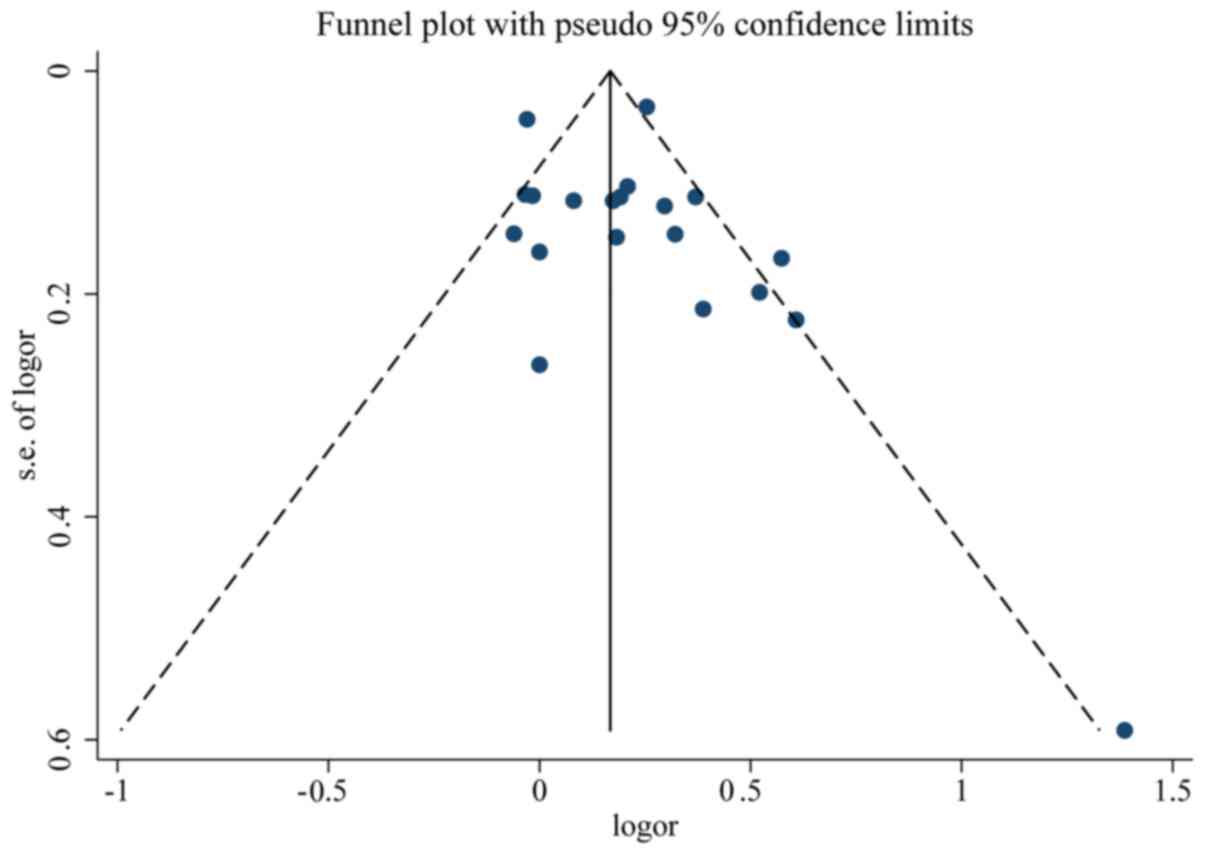|
1
|
Linnemann B: Antiphospholipid syndrome -
an update. Vasa. 47:451–464. 2018.PubMed/NCBI View Article : Google Scholar
|
|
2
|
Uthman I, Noureldine MH, Ruiz-Irastorza G
and Khamashta M: Management of antiphospholipid syndrome. Ann Rheum
Dis. 78:155–161. 2019.PubMed/NCBI View Article : Google Scholar
|
|
3
|
Carmi O, Berla M, Shoenfeld Y and Levy Y:
Diagnosis and management of catastrophic antiphospholipid syndrome.
Expert Rev Hematol. 10:365–374. 2017.PubMed/NCBI View Article : Google Scholar
|
|
4
|
Garcia D and Erkan D: Diagnosis and
management of the antiphospholipid syndrome. N Engl J Med.
379(1290)2018.PubMed/NCBI View Article : Google Scholar
|
|
5
|
Fujieda Y, Amengual O and Atsumi T:
Pathogenic role of antiphospholipid antibodies: An update. Lupus.
27:2012–2013. 2018.PubMed/NCBI View Article : Google Scholar
|
|
6
|
McIntyre JA, Coulam CB and Faulk WP:
Recurrent spontaneous abortion. Am J Reprod Immunol. 21:100–104.
1989.PubMed/NCBI View Article : Google Scholar
|
|
7
|
Subgroup O: Chinese society of obstetrics
and gynecology, Chinese medical association. Zhonghua Fu Chan Ke Za
Zhi. 51:3–9. 2016.
|
|
8
|
Lin QD and Qiu LH: Pathogenesis,
diagnosis, and treatment of recurrent spontaneous abortion with
immune type. Front Med China. 4:275–279. 2010.PubMed/NCBI View Article : Google Scholar
|
|
9
|
Miyakis S, Lockshin MD, Atsumi T, Branch
DW, Brey RL, Cervera R, Derksen RH, de Groot PG, Koike T, Meroni
PL, et al: International consensus statement on an update of the
classification criteria for definite antiphospholipid syndrome
(APS). J Thromb Haemost. 4:295–306. 2006.PubMed/NCBI View Article : Google Scholar
|
|
10
|
Carrington B, Sacks G and Regan L:
Recurrent miscarriage: Pathophysiology and outcome. Curr Opin
Obstet Gynecol. 17:591–597. 2005.PubMed/NCBI View Article : Google Scholar
|
|
11
|
Kuon RJ, Wallwiener LM, Germeyer A,
Strowitzki T, Daniel V and Toth B: Establishment of a standardized
immunological diagnostic procedure in RM patients. J Reprod
Immunol. 1(55)2012.
|
|
12
|
Christiansen OB: Evidence-based
investigations and treatments of recurrent pregnancy loss. Curr
Opin Obstet Gynecol. 18:304–312. 2006.PubMed/NCBI View Article : Google Scholar
|
|
13
|
Regan L and Rai R: Epidemiology and the
medical causes of miscarriage. Best Pract Res Clin Obstet Gynaecol.
14:839–854. 2000.PubMed/NCBI View Article : Google Scholar
|
|
14
|
Vinatier D, Dufour P, Cosson M and Houpeau
JL: Antiphospholipid syndrome and recurrent miscarriages. Eur J
Obstet Gynecol Reprod Biol. 96:37–50. 2001.PubMed/NCBI View Article : Google Scholar
|
|
15
|
Qiujuan Wang and Wenhua Xu: Pregnancy
complicated with antiphospholipid syndrome. Zhong Hua Fu Chan Ke Za
Zhi Bian Ji Bu. 30:117–119. 1995.(In Chinese).
|
|
16
|
Cervera R: Antiphospholipid syndrome.
Thromb Res. 151 (Suppl 1):S43–S47. 2017.PubMed/NCBI View Article : Google Scholar
|
|
17
|
Schreiber K and Hunt BJ: Managing
antiphospholipid syndrome in pregnancy. Thromb Res. 181 (Suppl
1):S41–S46. 2019.PubMed/NCBI View Article : Google Scholar
|
|
18
|
Del Ross T, Ruffatti A, Visentin MS,
Tonello M, Calligaro A, Favaro M, Hoxha A and Punzi L: Treatment of
139 pregnancies in antiphospholipid-positive women not fulfilling
criteria for antiphospholipid syndrome: A retrospective study. J
Rheumatol. 40:425–429. 2013.PubMed/NCBI View Article : Google Scholar
|
|
19
|
Rai RS, Clifford K, Cohen H and Regan L:
High prospective fetal loss rate in untreated pregnancies of women
with recurrent miscarriage and antiphospholipid antibodies. Hum
Reprod. 10:3301–3304. 1995.PubMed/NCBI View Article : Google Scholar
|
|
20
|
Zeng X, Sun Z and Tang H: Series ten of
meta-analysis: Formulation of eligibility criteria. Chin J Evid
Based Cardiovasc Med. 5:6–9. 2013.
|
|
21
|
McCormick F, Cvetanovich GL, Kim JM,
Harris JD, Gupta AK, Abrams GD, Romeo AA and Provencher MT: An
assessment of the quality of rotator cuff randomized controlled
trials: Utilizing the Jadad score and CONSORT criteria. J Shoulder
Elbow Surg. 22:1180–1185. 2013.PubMed/NCBI View Article : Google Scholar
|
|
22
|
Pattison NS, Chamley LW, Birdsall M,
Zanderigo AM, Liddell HS and McDougall J: Does aspirin have a role
in improving pregnancy outcome for women with the antiphospholipid
syndrome? A randomized controlled trial. Am J Obstet Gynecol.
183:1008–1012. 2000.PubMed/NCBI View Article : Google Scholar
|
|
23
|
Triolo G, Ferrante A, Ciccia F,
Accardo-Palumbo A, Perino A, Castelli A, Giarratano A and Licata G:
Randomized study of subcutaneous low molecular weight heparin plus
aspirin versus intravenous immunoglobulin in the treatment of
recurrent fetal loss associated with antiphospholipid antibodies.
Arthritis Rheum. 48:728–731. 2003.PubMed/NCBI View Article : Google Scholar
|
|
24
|
Tang H, Huang MY and Yi T: Effect of low
molecular weight heparin combined with low-dose aspirin for ACA
positive recurrent spontaneous abortion. J Hainan Med.
19-20:2012.
|
|
25
|
Rai R, Cohen H, Dave M and Regan L:
Randomised controlled trial of aspirin and aspirin plus heparin in
pregnant women with recurrent miscarriage associated with
phospholipid antibodies (or antiphospholipid antibodies). BMJ.
314:253–257. 1997.PubMed/NCBI View Article : Google Scholar
|
|
26
|
Farquharson RG, Quenby S and Greaves M:
Antiphospholipid syndrome in pregnancy: A randomized, controlled
trial of treatment. Obstet Gynecol. 100:408–413. 2002.PubMed/NCBI View Article : Google Scholar
|
|
27
|
Goel N, Tuli A and Choudhry R: The role of
aspirin versus aspirin and heparin in cases of recurrent abortions
with raised anticardiolipin antibodies. Med Sci Monit.
12:CR132–CR136. 2006.PubMed/NCBI
|
|
28
|
Dendrinos S, Sakkas E and Makrakis E:
Low-molecular-weight heparin versus intravenous immunoglobulin for
recurrent abortion associated with antiphospholipid antibody
syndrome. Int J Gynaecol Obstet. 104:223–225. 2009.PubMed/NCBI View Article : Google Scholar
|
|
29
|
Laskin CA, Spitzer KA, Clark CA, Crowther
MR, Ginsberg JS, Hawker GA, Kingdom JC, Barrett J and Gent M: Low
molecular weight heparin and aspirin for recurrent pregnancy loss:
Results from the randomized, controlled HepASA Trial. J Rheumatol.
36:279–287. 2009.PubMed/NCBI View Article : Google Scholar
|
|
30
|
Ismail AM, Hamed AH, Saso S, Abu-Elhasan
AM, Abu-Elghar MM and Abdelmeged AN: Randomized controlled study of
pre-conception thromboprophylaxis among patients with recurrent
spontaneous abortion related to antiphospholipid syndrome. Int J
Gynaecol Obstet. 132:219–223. 2016.PubMed/NCBI View Article : Google Scholar
|
|
31
|
Zhou X: The effect of aspirin combined
with low molecular weight heparin in treatment of 30 patients with
habitual abortion and antiphospholipid syndrome. Cn Mod Doct.
50:60–62. 2012.
|
|
32
|
Tulppala M, Marttunen M,
Söderstrom-Anttila V, Foudila T, Ailus K, Palosuo T and Ylikorkala
O: Low-dose aspirin in prevention of miscarriage in women with
unexplained or autoimmune related recurrent miscarriage: Effect on
prostacyclin and thromboxane A2 production. Hum Reprod.
12:1567–1572. 1997.PubMed/NCBI View Article : Google Scholar
|
|
33
|
Zhang G and Cheng L: Effect of low
molecular weight heparin combined with low dose aspirin on hormone
level and immune function in patients with recurrent spontaneous
abortion. Zhongguo Sheng Hua Yao Wu Za Zhi. 67-69:2015.(In
Chinese).
|
|
34
|
Cowchock FS, Reece EA, Balaban D, Branch
DW and Plouffe L: Repeated fetal losses associated with
antiphospholipid antibodies: A collaborative randomized trial
comparing prednisone with low-dose heparin treatment. Am J Obstet
Gynecol. 166:1318–1323. 1992.PubMed/NCBI View Article : Google Scholar
|
|
35
|
Jinhua F, Wang Z and Lang F: Study of
heparin on pregnant woman with recurrent pregnant loss and positive
anti-phospholipid antibody. Zhonghua Wei Chan Yi Xue Za Zhi
2003.
|
|
36
|
Clinical observation on 40 autoimmune
habitual abortion patients with low molecular weight heparin
calcium. China Practical Medicine 2009.
|
|
37
|
Madani T, Ahmadi F, Jahangiri N,
Bahmanabadi A and Bagheri Lankarani N: Does low-dose aspirin
improve pregnancy rate in women undergoing frozen-thawed embryo
transfer cycle? A pilot double-blind, randomized placebo-controlled
trial. J Obstet Gynaecol Res. 45:156–163. 2019.PubMed/NCBI View Article : Google Scholar
|
|
38
|
Blomqvist L, Hellgren M and Strandell A:
Acetylsalicylic acid does not prevent first-trimester unexplained
recurrent pregnancy loss: A randomized controlled trial. Acta
Obstet Gynecol Scand. 97:1365–1372. 2018.PubMed/NCBI View Article : Google Scholar
|
|
39
|
Bao SH, Sheng SL, Liao H, Zhou Q, Frempong
ST and Tu WY: Use of D-dimer measurement to guide anticoagulant
treatment in recurrent pregnancy loss associated with
antiphospholipid syndrome. Am J Reprod Immunol.
78(78)2017.PubMed/NCBI View Article : Google Scholar
|
|
40
|
Maged AM, Abdelhafiz A, Mostafa WA,
El-Nassery N, Fouad M, Salah E and Kotb A: The role of prophylactic
use of low dose aspirin and calheparin in patients with unexplained
recurrent abortion. Gynecol Endocrinol. 32:970–972. 2016.PubMed/NCBI View Article : Google Scholar
|
|
41
|
Zhang Shuyun ZH: Clinical analysis of low
molecular weight heparin and aspirin in treating recurrent
pregnancy loss caused by antiphospholipid antibodies. Hebei Med.
24:422–426. 2018.
|
|
42
|
Zhaojuan S: Evaluation of the efficacy of
low molecular weight heparin combined with aspirin in the treatment
of recurrent abortion caused by anti-phospholipid antibody. J Pract
Gynecol Endocrinol. 5:53–54. 2018.
|
|
43
|
Liang RH: Effect of low molecular weight
heparin combined with Zishen Yutai pill for RSA caused by positive
ACA. Chin Youjiang Med J. 43:471–473. 2015.
|
|
44
|
Schreiber K, Sciascia S, de Groot PG,
Devreese K, Jacobsen S, Ruiz-Irastorza G, Salmon JE, Shoenfeld Y,
Shovman O and Hunt BJ: Antiphospholipid syndrome. Nat Rev Dis
Primers. 4(17103)2018.PubMed/NCBI View Article : Google Scholar
|
|
45
|
Galli M and Barbui T: Antiphospholipid
antibodies and pregnancy. Best Pract Res Clin Haematol. 16:211–225.
2003.PubMed/NCBI View Article : Google Scholar
|
|
46
|
D'Ippolito S, Di Simone N, Di Nicuolo F,
Castellani R and Caruso A: Antiphospholipid antibodies: Effects on
trophoblast and endothelial cells. Am J Reprod Immunol. 58:150–158.
2007.PubMed/NCBI View Article : Google Scholar
|
|
47
|
Katsuragawa H, Kanzaki H, Inoue T, Hirano
T, Mori T and Rote NS: Monoclonal antibody against
phosphatidylserine inhibits in vitro human trophoblastic hormone
production and invasion. Biol Reprod. 56:50–58. 1997.PubMed/NCBI View Article : Google Scholar
|
|
48
|
Di Simone N, Raschi E, Testoni C,
Castellani R, D'Asta M, Shi T, Krilis SA, Caruso A and Meroni PL:
Pathogenic role of anti-beta 2-glycoprotein I antibodies in
antiphospholipid associated fetal loss: Characterisation of beta
2-glycoprotein I binding to trophoblast cells and functional
effects of anti-beta 2-glycoprotein I antibodies in vitro. Ann
Rheum Dis. 64:462–467. 2005.PubMed/NCBI View Article : Google Scholar
|
|
49
|
Chamley LW: Antiphospholipid antibodies:
Biological basis and prospects for treatment. J Reprod Immunol.
57:185–202. 2002.PubMed/NCBI View Article : Google Scholar
|
|
50
|
Lopez-Pedrera CH, Aguirre MA, Ruiz-Limon
P, Pérez-Sánchez C, Jimenez-Gomez Y, Barbarroja N and Cuadrado MJ:
Immunotherapy in antiphospholipid syndrome. Int Immunopharmacol.
27:200–208. 2015.PubMed/NCBI View Article : Google Scholar
|
|
51
|
Sebire NJ, Fox H, Backos M, Rai R,
Paterson C and Regan L: Defective endovascular trophoblast invasion
in primary antiphospholipid antibody syndrome-associated early
pregnancy failure. Hum Reprod. 17:1067–1071. 2002.PubMed/NCBI View Article : Google Scholar
|
|
52
|
Franklin RD and Kutteh WH: Effects of
unfractionated and low molecular weight heparin on antiphospholipid
antibody binding in vitro. Obstet Gynecol. 101:455–462.
2003.PubMed/NCBI View Article : Google Scholar
|
|
53
|
Girardi G: Heparin treatment in pregnancy
loss: Potential therapeutic benefits beyond anticogulation. J
Reprod Lmmunol. 66:45–51. 2005.PubMed/NCBI View Article : Google Scholar
|
|
54
|
Bates SM, Greer IA, Middeldorp S, Veenstra
DL, Prabulos AM and Vandvik PO: VTE, thrombophilia, antithrombotic
therapy, and pregnancy: Antithrombotic therapy and prevention of
thrombosis, 9th Ed: American College of Chest Physicians
Evidence-Based Clinical Practice Guidelines. Chest. 141 (Suppl
2):e691S–e736S. 2012.PubMed/NCBI View Article : Google Scholar
|
|
55
|
Makino A and Sugiura-Ogasawara M:
Anticoagulant therapy and pregnancy. Reprod Med Biol. 7:1–10.
2008.PubMed/NCBI View Article : Google Scholar
|
|
56
|
Girardi G, Redecha P and Salmon JE:
Hepafin prevents antiphospholipid antibody-induced fetal loss by
inhibiting complement activation. Nat Med. 10:1222–1226.
2004.PubMed/NCBI View
Article : Google Scholar
|
|
57
|
Hills FA, Abrahams VM, González-Timón B,
Francis J, Cloke B, Hinkson L, Rai R, Mor G, Regan L, Sullivan M,
et al: Heparin prevents programmed cell death in human trophoblast.
Mol Hum Reprod. 12:237–243. 2006.PubMed/NCBI View Article : Google Scholar
|
|
58
|
Hertz-Picciotto I, Hopenhayn-Rich C, Golub
M and Hooper K: The risks and benefits of taking aspirin during
pregnancy. Epidemiol Rev. 12:108–148. 1990.PubMed/NCBI View Article : Google Scholar
|
|
59
|
Shim YK and Kim N: Nonsteroidal
anti-inflammatory drug and aspirin-induced peptic ulcer disease.
Korean J Gastroenterol. 67:300–312. 2016.PubMed/NCBI View Article : Google Scholar
|



















